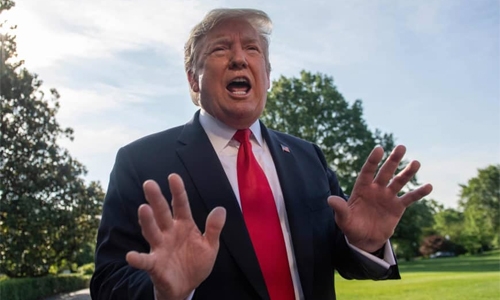Trump urges to go for no-deal Brexit
US President Donald Trump waded once again yesterday into Britain’s Brexit debate on the eve of a state visit to London, urging Theresa May’s successor to leave the EU with no deal. Whoever takes over as Britain’s next prime minister should not be afraid to “walk away” from negotiations with Brussels and should refuse to pay the agreed divorce bill, he told the Sunday Times newspaper.
The intervention comes after Trump used another newspaper interview to declare that former foreign minister Boris Johnson would be an “excellent” replacement for May. Britain is rolling out the red carpet for the president this week, starting with a private lunch with Queen Elizabeth II and a state banquet at Buckingham Palace on Monday.
But large protests are also planned over what London Mayor Sadiq Khan described as Trump’s “divisive behaviour”, while opposition politicians are boycotting the banquet.
‘I wouldn’t pay’
Trump embarrassed May with outspoken remarks on Brexit during his visit to Britain last year. On Sunday he again urged the next government to follow his own negotiating rule book. “If they don’t get what they want, I would walk away... If you don’t get the deal you want, if you don’t get a fair deal, then you walk away,” he said. May has already agreed to pay £39 billion (45 billion euros, $50 billion) to cover Britain’s liabilities as it moves to sever four decades of EU membership. But Trump said: “If I were them I wouldn’t pay $50 billion. That is me.
I would not pay, that is a tremendous number.” May agreed a divorce agreement with Brussels last November, but British MPs have rejected it three times and she has had to delay Brexit twice. She has now been forced out and her Conservative party is beginning the process of finding a new leader, with 13 candidates already declared. Johnson, one of the frontrunners, is among several to say Britain should leave the EU on October 31 with or without a deal.
They are under pressure from the Brexit party, the latest political vehicle of anti-EU populist leader Nigel Farage, which came top in European Parliament elections last month. Trump said he believed Farage should play a role in negotiating Brexit with the European Union, saying he had a “lot to offer”.
Conservatives divided
Three years after Britons voted by 52 percent to 48 percent to leave the EU in 2016, the government and lawmakers are still wrangling over the issue. Brexit day was originally set for March 29. But May delayed it twice to avoid a damaging “no deal” exit, under which Britain would separate from its closest trading partner with no new arrangements in place. Her own Conservative MPs had blocked the deal because they feared it would leave Britain too closely tied to the EU. Many candidates to replace her want to renegotiate the text on EU withdrawal, although the EU has explicitly ruled that out.
If they cannot, several say Britain must leave anyway. However, one frontrunner, Environment Secretary Michael Gove, was reported Sunday to be ready to delay Brexit again to avoid a “no deal” scenario. Meanwhile voters across the country are divided. Although Farage won the most votes in European elections, the Liberal Democrats, who want a new referendum to reverse Brexit, came second.
Trade talks
Britain’s future trading relationship with the United States will be crucial to its post-Brexit success and likely discussed during Trump’s talks with May at Downing Street this week. But some here fear Britain would be steamrolled by the far bigger US into accepting an unbalanced accord, especially given Trump’s “America First” stance in shaking up trade ties with Mexico, Canada, Japan and China.
US Ambassador to Britain Woody Johnson told BBC television that Washington was already preparing the way for a trade deal and it would be done “as expeditiously as any agreement we’ve ever had”. He said he would expect Britain to be open to US agricultural products, and when asked about access of US firms to Britain’s cherished state-run health service, said “all things that are traded would be on the table”.
Related Posts

